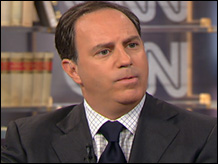|
|
|
|

|
| What impact is the death of Saudi Arabia's King Fahd having on crude oil prices? CNN's Andy Serwer reports. (August 1) |
Play video
|
|
|
|
|
|
NEW YORK (CNN/Money) -
Oil prices gained a dollar to hit a new settlement high above $61 Monday as the market weighed the death of Saudi Arabia's King Fahd, a string of refinery outages and tensions over Iran's nuclear ambitions.
U.S. light, sweet crude for September delivery gained $1, or nearly 2 percent, to reach $61.57 a barrel, slightly above the previous record settlement price of $61.28, set July 6.
Prices briefly touched a fresh record trading high of $62.30 during the session, but pared those gains.
Crude prices have climbed 40 percent this year as the Organization of Petroleum Exporting Countries is producing at 25-year highs to meet demand.
King Fahd died Monday and will be succeeded by Crown Prince Abdullah, his half-brother, who has been the de facto ruler of Saudi Arabia since Fahd suffered a stroke in 1995.
Abdullah will adhere to Saudi Arabia's long-standing oil policy aimed at ensuring that global markets are well supplied, the kingdom's next U.S. ambassador, Prince Turki al-Faisal, said.
But analysts said markets were jittery over longer-term Saudi policy, noting that the new king and crown prince were both octogenarians.
"It's all part of the whole picture that's been going on for over a year and a half already," said Thomas Bentz, senior energy analyst at BNP Paribas Commodity Futures.
Refineries under strain
A spate of refinery problems in the U.S. also resurrected concerns about meeting strong fuel demand.
Exxon Mobil (Research) added to the weekend anxiety as it shut down its 235,000 barrels per day Joliet refinery in Illinois, according to trade sources.
BP also shut down a gasoline-producing unit over the weekend at its giant Texas City refinery -- the third-largest in the United States and source of 3 percent of its gasoline -- for maintenance, a regulatory filing showed.
"Anytime we have refinery issues, the market just takes off again. We're back in the uptrend," Bentz said.
Although stockpiles of most fuels are relatively healthy for this time of year, traders fear refiners may be hard-pressed to satisfy rising summer motor fuel consumption while also stocking up enough distillate supplies to meet peak winter consumption.
Iran tensions
Iran -- OPEC's second largest oil producer -- also rattled the market by saying it had restarted a nuclear facility that the West suspects could help it build a nuclear bomb.
The move was in defiance of European Union warnings and could lead to Iran's case being sent to the United Nations Security Council for possible sanctions.
-- from staff and wire reports
------------------
What does the new energy bill mean for you?Click here.
Are oil prices primed to climb? Click here.

|